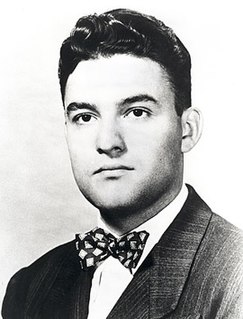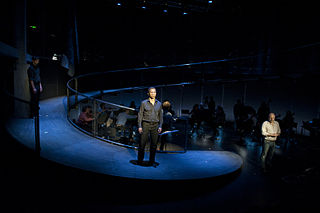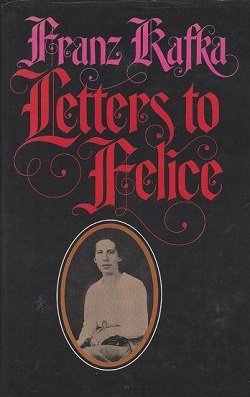
The Metamorphosis is a novella written by Franz Kafka which was first published in 1915. One of Kafka's best-known works, The Metamorphosis tells the story of salesman Gregor Samsa who wakes one morning to find himself inexplicably transformed into a huge insect and subsequently struggling to adjust to this new condition. The novella has been widely discussed among literary critics, with differing interpretations being offered.

"A Hunger Artist" is a short story by Franz Kafka first published in Die neue Rundschau in 1922. The story was also included in the collection A Hunger Artist, the last book Kafka prepared for publication, printed by Verlag Die Schmiede after Kafka's death. The protagonist, a hunger artist who experiences the decline in appreciation of his craft, is an archetypical creation of Kafka: an individual marginalized and victimized by society at large. The title of the story has been translated also to "A Fasting Artist" and "A Starvation Artist".
"In the Penal Colony" is a short story by Franz Kafka written in German in October 1914, revised in November 1918, and first published in October 1919.

Amerika, also known as The Man Who Disappeared, The Missing Person and as Lost in America, is the incomplete first novel of author Franz Kafka (1883–1924), written between 1911 and 1914 and published posthumously in 1927. The novel originally began as a short story titled "The Stoker". The novel incorporates many details of the experiences of his relatives who had emigrated to the United States. The commonly used title Amerika can be traced to the edition of the text put together by Max Brod, a close friend of Kafka's during the latter's lifetime, after Kafka's death in 1924.

"The Judgment" is a short story written by Franz Kafka in 1912, concerning the relationship between a man and his father.
"A Report to an Academy" is a short story by Franz Kafka, written and published in 1917. In the story, an ape named Red Peter, who has learned to behave like a human, presents to an academy the story of how he effected his transformation. The story was first published by Martin Buber in the German monthly Der Jude, along with another of Kafka's stories, "Jackals and Arabs". The story appeared again in a 1919 collection titled Ein Landarzt.
Richard Greenberg is an American playwright and television writer known for his subversively humorous depictions of middle-class American life. He has had more than 25 plays premiere on and off-broadway in New York City and eight at the South Coast Repertory Theatre, including The Violet Hour, Everett Beekin, and Hurrah at Last.

Kafka on the Shore is a 2002 novel by Japanese author Haruki Murakami. Its 2005 English translation was among "The 10 Best Books of 2005" from The New York Times and received the World Fantasy Award for 2006.

Jack Greenberg was an American attorney and legal scholar. He was the Director-Counsel of the NAACP Legal Defense Fund from 1961 to 1984, succeeding Thurgood Marshall.

"Description of a Struggle" is a short story by Franz Kafka. It contains the dialogues "Conversation with the Supplicant" and "Conversation with the Drunk"

The Complete Stories of Franz Kafka is a compilation of all of Kafka's short stories. With the exception of three novels, this collection includes all of his narrative work. The book was originally edited by Nahum N. Glatzer and published by Schocken Books in 1971. It was reprinted in 1995 with an introduction by John Updike.
Hunger Artist may refer to:
"First Sorrow" is a short story by Franz Kafka probably written between the fall of 1921 and the spring of 1922. It appeared in Kurt Wolff Verlag's art periodical Genius, III no. 2 and in the Christmas 1923 supplement to the Prager Presse. The story was also included in the collection A Hunger Artist published by Verlag Die Schmiede soon after Kafka's death.
Franz Kafka: The Office Writings is a collection of essays, letters and articles composed by Franz Kafka during his years as a high-ranking lawyer with the largest Workmen's Accident Insurance Institute in the Czech lands of the Austro-Hungarian Empire. The collection was edited by Stanley Corngold, Jack Greenberg, and Benno Wagner, and translated by Eric Patton and Ruth Hein. The book includes introductory essays by Corngold and Wagner, as well as commentary following each of Kafka's texts, and an epilogue by Greenberg.
"A Fratricide" is a short story by Franz Kafka written between December 1916 and January 1917. It is one of Kafka's most realistically descriptive and graphically violent stories, and tells the story of a murderer, Schmar, and his victim, Wese. Although no clear motive for the murder is given anywhere in the story, it can be ascertained that the crime is a matter of jealous passion. Apart from the title, there is no obvious indication that the two characters are brothers, and the title may be an allusion to the biblical story of Cain and Abel.
Martin Greenberg is an American poet and translator.
"The Silence of the Sirens" is a short story by Franz Kafka. It was not published until 1931, seven years after his death. Max Brod selected stories and published them in the collection Beim Bau der Chinesischen Mauer. The first English translation by Willa and Edwin Muir was published by Martin Secker in London in 1933. It appeared in The Great Wall of China. Stories and Reflections.
"Shamefaced Lanky and Impure in Heart" is the name usually given to Franz Kafka's earliest surviving work of fiction, a short story that he wrote in 1902 and that has survived only because it was included in a letter to his friend Oskar Pollack.

In the Penal Colony is a chamber opera in one act and 16 scenes composed by Philip Glass to an English-language libretto by Rudy Wurlitzer. The opera is based on Franz Kafka's German-language short story "In the Penal Colony". It was commissioned by ACT Theatre in Seattle, Washington, where it premiered on August 31, 2000. It has a running time of approximately 80 minutes and is scored for two singers and a string quintet.











